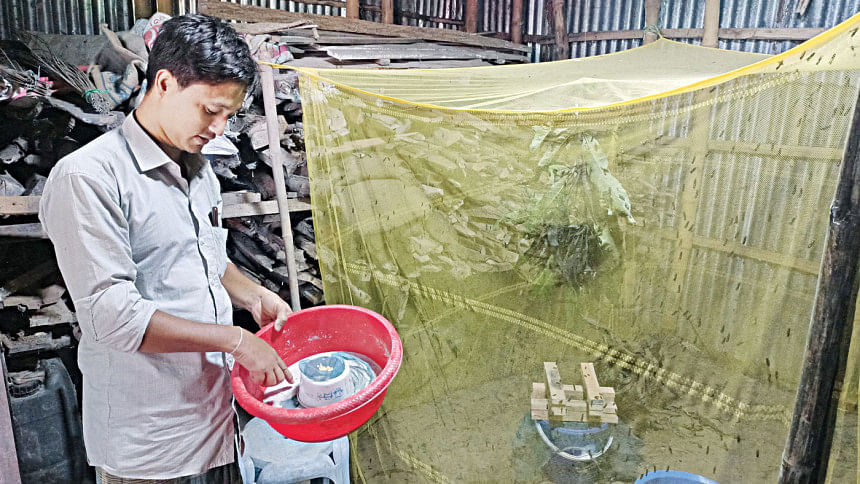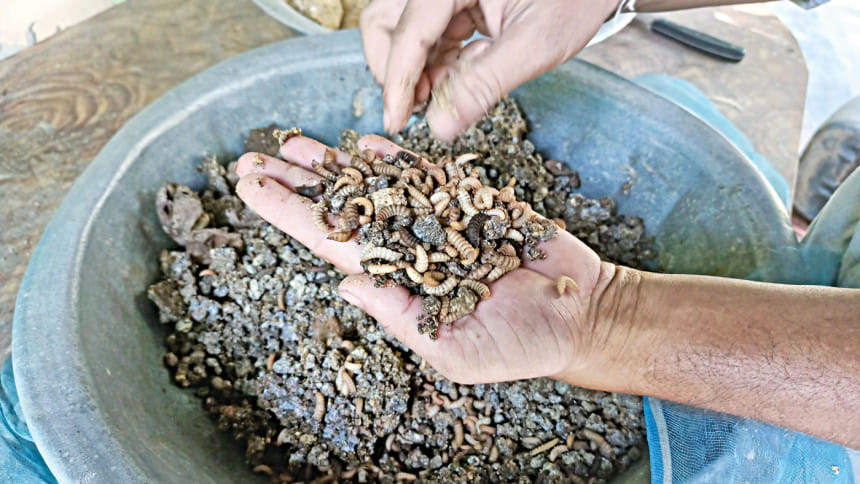Maggots creeping their way into farms

The larvae of black soldier flies, a common insect in the Stratiomyidae family, can be used as organic poultry and fish feed, providing farmers with a cheap alternative to the comparatively high priced products currently available.
Besides, farmers can raise the insects to harvest larvae on their own.
Black soldier fly larvae, or maggots, are a great source of high-quality protein and is a good alternative to fish meal in organic poultry and fish production, according to research from Aarhus University, Denmark.
As such, insect farms are cropping up across Rangpur, where educated but unemployed youths are getting new employment opportunities in maggot production.
The youths engaged in farming black soldier flies say the practice is common in places like the US, where a bulk of animal and fish feed comprises live larvae.

The insects are being produced in small quantities at this stage but the scope is increasing day by day.
Other than creating employment opportunities while catering to the domestic demand for animal feed, large scale maggot production would also generate a huge amount of organic fertiliser.
This is because the black soldier fly larvae has a remarkable ability to transform nearly any kind of organic waste into high-quality protein by ingesting it. The insect's droppings can then be collected as a high-value fertiliser.
To produce the maggots, black soldier flies are kept in rooms with decomposed food, chicken droppings and other forms of organic garbage. Each fly then lays between 900 to 1,000 pupae that are kept in containers until they grow into maggots within 14 to 18 days.
The whole process requires a mosquito net, a few pots, and pieces of wood.
If farmers were to cultivate these insects on a large scale, they would be able to produce 100 to 500 kilogrammes (kgs) of larvae per day.
Nur Amin, an honours student from Thetrai village in Kurigram's Ulipur upazila, told the Daily Star that he produced an average of 10 kgs of larvae per day for the last one month.
He uses these insects to feed the animals at his own poultry farms and expects to have a year's worth of feed within the next four or five months.
"So even though insect production is neglected, it is clearly beneficial," Amin said.
Nibaran Chandra Roy, a college student from Panchagram village in Lalmonirhat Sadar upazila, told the Daily Star that it is easy to harvest maggots from black soldier flies.
After spending three days to learn the process at a farm in Rangpur, Roy now has his own insect farm that produces two kgs of maggots each day. He now dreams of expanding his operations and opening a fish farm that would be fed with his larvae.
Dipta Kumar Mohanta, a master's student at Ramdev village, said he started his small-scale insect farm three weeks ago with one kgs of black soldier fly larvae.
Since then, he has produced five kgs of maggots and is working to expand further.
"I hope in the next 2-3 months I will be able to make a profit by selling the insects. Also, we can cultivate fish in our pond and use these insects as feed for them," he added.
Abdar Ali, owner of a poultry farm in Lalmonirhat, told the Daily Star that he buys an average of about Tk 7,000 to Tk 8,000 worth of poultry feed every day to feed 2,000 birds at his farm.
And with the price of regular poultry feed creeping up, he has not been able to make his expected profits as of late.
"But now that I have learned about farming maggots from the black soldier fly, I am preparing to produce the insects next to the farm," he said, adding that he hopes to start production from January.
Priyanath Sarkar, a fish farmer from Kurigram, said he buys an average of Tk 5,000 worth of fish food every day for his six-acre pond.
And after recently coming to know about insect farming, he started producing five to six kgs of black soldier fly larvae every day and found that they were an excellent food for fish.
"So if I can produce an average of 35 kgs to 40 kgs per day, my feed demand will be met," he said.
Shamim Ashraf, deputy director of the Department of Agricultural Extension in Lalmonirhat, said high quality of organic manure can be recovered from the waste that remains after producing maggots.
Few people have gotten involved in the insect farm business so far but its scope is increasing day by day, he added.
"No government decision has been taken yet regarding large-scale production of black soldier fly larvae," Dr Jahangir Alam, district livestock officer of Lalmonirhat, told The Daily Star.
Some farm owners are producing insects on their own volition and the method they are using will not cause any harm to the environment.
"Instead, the use of garbage is benefiting the environment and so, if the government decides, we will be able to train enthusiastic farmers to produce maggots from the black soldier fly," he added.

 For all latest news, follow The Daily Star's Google News channel.
For all latest news, follow The Daily Star's Google News channel. 



Comments